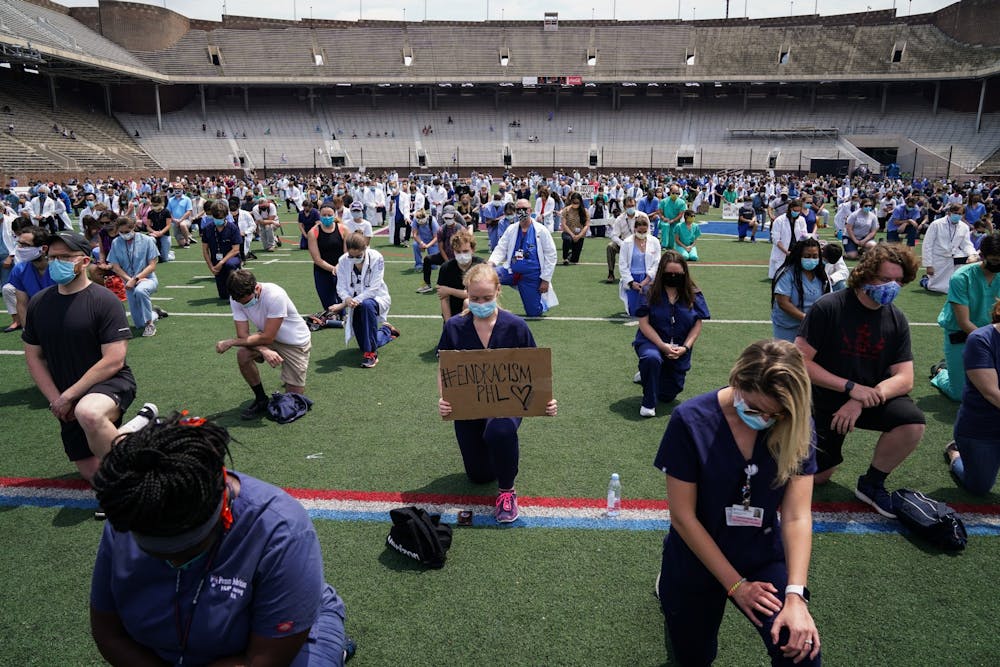As demonstrators continue to fill the streets of Philadelphia and major cities across the nation, hundreds of healthcare workers gathered at Franklin Field on Friday to honor George Floyd and protest against racial inequality in the U.S. healthcare system.
The demonstration, called 'White Coats for Black Lives,' was organized by Michal Elovitz, the Vice Chair of Translational Research at Penn Medicine. Elovitz and Florencia Polite, the Chief of General Obstetrics and Gynecology at Penn Medicine, offered short remarks in front of the large group of healthcare workers before they knelt in silence for eight minutes and 46 seconds — the amount of time Derek Chauvin, a white Minneapolis police officer, knelt on Floyd’s neck.
Elovitz said that the event was put together in 48 hours after she felt that there was not enough response from Penn Medicine and the national healthcare community.
“We take care of an underserved and racially diverse population, and we need to check our implicit, our unconscious, and our conscience bias, and we need to do better by them,” Elovitz said.
Staff members of the Hospital of the University of Pennsylvania, the Children’s Hospital of Philadelphia, and other local medical facilities walked out of their shifts on June 5 and arrived at Franklin Field by the hundreds.
Franklin Field, which has been closed along with the majority of Penn's facilities due to the COVID-19 pandemic, reopened specially for the event so that all of the healthcare workers could safely participate in the demonstration before returning to work. Many workers left Franklin Field with their arms raised, chanting, “Hands up, don’t shoot!”

Florencia Polite, the Chief of General Obstetrics and Gynecology at Penn Medicine, spoke about systemic racism before the kneeling took place.
“We are going to be uncomfortable," Polite said in her speech prior to the kneeling demonstration. "Our knees are going to hurt, and that is the point. We have been comfortable for far too long.”
RELATED:
Thousands of activists march through Philadelphia protesting police murder of George Floyd
Live updates — Philadelphia protests over George Floyd's murder for eighth straight day
The 'White Coats for Black Lives' demonstration occurred at the intersection of a global health pandemic and nationwide protests for systematic justice, in response to the murder of Floyd, which have put a unique spotlight on racial inequities in the U.S. healthcare system.
According to Philadelphia data, African-Americans represent 45.9 percent of coronavirus cases and 50.5 percent of deaths in the city, by far the largest percentage of all racial groups in the city. Polite was quick to acknowledge the intersection of COVID-19 and racial inequality.
“Systemic racism is a problem that’s always been here, right now we’re just dealing with the acute-on-chronic,” Polite said. “It’s been a rough 14 weeks with COVID, it’s been a rough 400 years for black people, and it’s been a really rough one week.”
Members of the Penn Medicine community, including third-year pathology resident Jenna Reece, said the demonstration was a clear and easy chance to speak out against the racial inequities that have plagued the healthcare system for years, as well as an opportunity to help push for change.
“Here is an opportunity to actually speak out against [white supremacy],” Reece said. “I could not look my future children and grandchildren in the eye and say I didn’t do something.”









